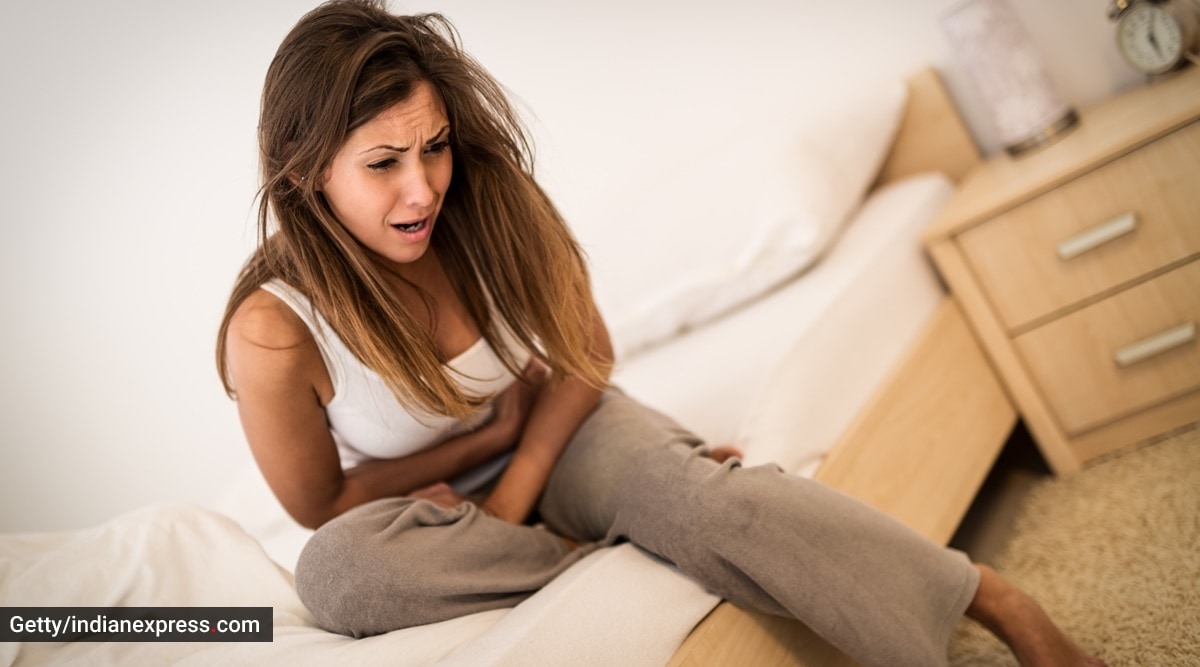 As endometriosis hampers the quality of life due to constant pain, dymenorrhoea, dyspareunia, and loss of concentration and self esteem, early diagnosis and follow-ups with the doctor is indicated, recommended Dr Sushruta Mokadam, senior consultant obstetrician and gynecologist, Motherhood Hospital, Kharadi, Pune. (Source: Getty Images/Thinkstock)
As endometriosis hampers the quality of life due to constant pain, dymenorrhoea, dyspareunia, and loss of concentration and self esteem, early diagnosis and follow-ups with the doctor is indicated, recommended Dr Sushruta Mokadam, senior consultant obstetrician and gynecologist, Motherhood Hospital, Kharadi, Pune. (Source: Getty Images/Thinkstock) There is a sharp rise in endometriosis (a multi-system disorder) cases as many women complain of painful menstruation, cramping, painful sex, constipation, loose motions, bloating, back pain, leg pain, pain while urinating, pain while passing stools, and rectal bleeding. However, there are many women who are asymptomatic, too. Timely diagnosis, appropriate treatment and considerable knowledge about the disease will help women to improve their quality of life, doctors advise.
“Endometriosis affects girls and women of reproductive age and is attached to any organ associated with reproduction. It can be described as an abnormal growth of tissues resembling the uterine lining outside the uterus. The cause of endometriosis is unknown although there are many theories. The common symptoms are intense pelvic pain, infertility, long menstrual cycles, nausea, or vomiting,” said Dr Abhishek Mangeshikar, consultant laparoscopic and robotic gynaecologist, ACI Cumball Hill Hospital.
The main reason women should be aware of endometriosis is that the disease is quite common and not rare. “It affects more in women than breast cancer. Many have not heard of it and the disease has not got the attention it deserves typically because it is not terminal. Many women may complain of excessive pain during periods. It is mistaken to be normal and they are asked to be stronger due to the lack of awareness,” he added.
As endometriosis hampers the quality of life due to constant pain, dymenorrhoea, dyspareunia, and loss of concentration and self esteem, early diagnosis and follow-ups with the doctor is indicated, recommended Dr Sushruta Mokadam, senior consultant obstetrician and gynecologist, Motherhood Hospital, Kharadi, Pune. “Foods rich in Omega-3 fatty acids (chia, flax seeds, walnuts, salmon), fresh fruits and vegetables, avoidance of trans-fats, avoiding intake of alcohol and caffeine, and a regular exercise regimen are found to help relieve and resolve symptoms of endometriosis,” Dr Mokadam said.
 Avoid intake of caffeine. (Source: Getty/Thinkstock)
Avoid intake of caffeine. (Source: Getty/Thinkstock)
According to experts, stage I of endometriosis is minimal wherein the patient may have small adhesions and small amounts of endometriosis tissue on an ovary. It may also include inflammation in or around the pelvic area. Stage II is mild and there are more adhesions on or around the ovaries. These adhesions are defined to be “too insignificant” at this stage and are usually too small to be picked up on ultrasound unless the doctor pays attention to probe tenderness in the region while examining the ovary. Stage III is moderate where adhesions will be blatantly obvious and usually, there may be cysts on the ovaries. There may be growths in other areas of the pelvis blurring into the territory of stage IV endometriosis.
“Stage IV is the final stage associated with a large number of cysts and severe adhesions. Most of the cysts will appear on the ovaries while the adhesions will appear over the pelvic lining and may affect the fallopian tubes and bowels. This can make bowel movements terribly uncomfortable and period pain the absolute worst,” explained Dr Mangeshikar.
Endometriosis needs its own subspecialty and this advanced disease is outside the realm of routine obstetrics and gynaecology practice, it must be dealt with by specialised endometriosis centers, Dr Mangeshikar suggested. “Surgery needs to be done by a well-trained, well-coordinated team of specialists and treatments need to be tailored toward the patient and not just towards the disease. Every case is different and treatment has to be tailored,” he mentioned, adding that the patient is discharged usually within 24–72 hours depending on their recovery and complexity of the surgery.
During the second wave, only those patients with severe pain who needed emergent surgery and procured the necessary documents for them to travel during lockdown were treated. “We operated 10 cases successfully during the second wave. Since the last nine months, I have seen hundreds of patients with endometriosis (in person and teleconsultation). I have limited the number of surgeries to emergency and semi-emergency cases so as not to utilise limited resources during Covid and we successfully managed 56 cases of advanced endometriosis during this time. About 25 per cent of cases suffer from fertility issues but more than 90 per cent suffer from pain,” highlighted Dr Mangeshikar.
For more lifestyle news, follow us: Twitter: lifestyle_ie | Facebook: IE Lifestyle | Instagram: ie_lifestyle
- The Indian Express website has been rated GREEN for its credibility and trustworthiness by Newsguard, a global service that rates news sources for their journalistic standards.

